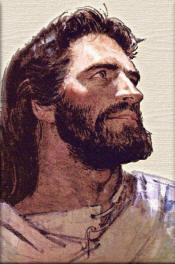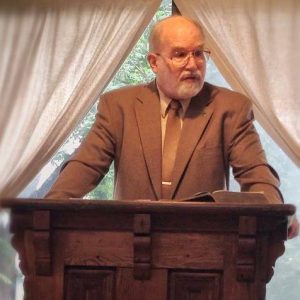“GOOD NEWS FOR ZACHARIAS,” Luke 1:5-25
A sermon perached at University Church, Athens, Ga., 9/3/17
Luke 1:5 In the days of Herod, king of Judea, there was a priest named Zacharias, of the division of Abijah; and he had a wife from the daughters of Aaron, and her name was Elizabeth. 6 They were both righteous in the sight of God, walking blamelessly in all the commandments and requirements of the Lord. 7 But they had no child, because Elizabeth was barren, and they were both advanced in years. 8 Now it happened that while he was performing his priestly service before God in the appointed order of his division, 9 according to the custom of the priestly office, he was chosen by lot to enter the temple of the Lord and burn incense. 10 And the whole multitude of the people were in prayer outside at the hour of the incense offering. 11 And an angel of the Lord appeared to him, standing to the right of the altar of incense. 12 Zacharias was troubled when he saw the angel, and fear gripped him. 13 But the angel said to him, “Do not be afraid, Zacharias, for your petition has been heard, and your wife Elizabeth will bear you a son, and you will give him the name John. 14 “You will have joy and gladness, and many will rejoice at his birth. 15 “For he will be great in the sight of the Lord; and he will drink no wine or liquor, and he will be filled with the Holy Spirit while yet in his mother’s womb. 16 “And he will turn many of the sons of Israel back to the Lord their God. 17 “It is he who will go as a forerunner before Him in the spirit and power of Elijah, to turn the hearts of the fathers back to the children, and the disobedient to the attitude of the righteous, so as to make ready a people prepared for the Lord.” 18 Zacharias said to the angel, “How will I know this for certain? For I am an old man and my wife is advanced in years.” 19 The angel answered and said to him, “I am Gabriel, who stands in the presence of God, and I have been sent to speak to you and to bring you this good news. 20 “And behold, you shall be silent and unable to speak until the day when these things take place, because you did not believe my words, which will be fulfilled in their proper time.” 21 The people were waiting for Zacharias, and were wondering at his delay in the temple. 22 But when he came out, he was unable to speak to them; and they realized that he had seen a vision in the temple; and he kept making signs to them, and remained mute. 23 When the days of his priestly service were ended, he went back home. 24 After these days Elizabeth his wife became pregnant, and she kept herself in seclusion for five months, saying, 25 “This is the way the Lord has dealt with me in the days when He looked with favor upon me, to take away my disgrace among men.”
INTRODUCTION: Christmas will be here before you know it. Do you have your shopping done? Started? As we look forward to the celebration of Advent, I would like to begin a “pre-Advent” series, as it were, by surveying the Christmas narratives in Luke’s gospel. And I would like to start at the beginning, with parts of the story that don’t usually get much attention. They instruct us by rooting the coming of our Lord in both the Old Testament revelation and contemporary Jewish worship.
The whole Old Testament was indeed one long preparation for the coming of Messiah. In Gen. 3:15 we have the first promise of a coming Savior, who would crush the head of the Edenic Serpent, reversing for his people the effects of Adam’s rebellion. Then Abraham was called to form a nation who would know God, and whose history, culture, and religion would enable the whole world to make sense of the Messiah when he came.

The Way, the Truth, and the Life
The most interesting part of that story as it relates to this passage may be the way the nation of Israel began: with the first of a series of supernatural births which would culminate in the familiar ones in Luke. Isaac should not have been born, naturally, and neither should Samson or Samuel. They establish a pattern of a supernatural birth preceding a critical moment in the history of God’s people and a new revelation of His saving power. Now in the New Testament the same phenomenon reappears in John the Baptist and is turned up a notch to a new level in Jesus. The supernaturally enabled births of John and Jesus did not happen out of the blue, but were recognizable as the last steps in a pattern God had used of old to create his people and raise up deliverers for them.
The whole history of Israel—Passover, Exodus, Sinai—revealed the person of God and the nature of his covenant. Then the Davidic kingdom was a foreshadowing of the rule of Messiah, who would arise from David’s line to bring the Kingdom of God to men. And the Prophets promised a coming one–Davidic King, Son of Man, Suffering Servant, Wonderful Counselor, Mighty God, Everlasting Father, Prince of Peace—who would deliver God’s people in an ultimate and climactic sense.
Now after centuries of waiting we have finally entered the last stage of this process. For 400 years now the Prophets have been silent. Rome rules the world with an iron fist, and the Jews ask, “When will the promised King come to deliver us?”—little understanding their need for deliverance from a much greater Enemy than Rome. So an obscure priest named Zacharias comes to Jerusalem to take his turn in the Temple service. There are too many descendants of Levi by now for them all to serve regularly, so most of them wait a lifetime for their one opportunity to offer up incense upon the altar. This moment then was the climax of Zacharias’ whole life; it would have been felt as such even if no angel had appeared. As he enters the holy place, a crowd of the devout and those who would appear devout gather in the courtyard to pray. A bell rings to signal that Zacharias has placed the incense upon the flames, symbolic of the prayers of the people rising up to God. A dead silence falls—but it lasts longer than they were expecting. The people wait for the priest to reappear and pronounce God’s blessing upon them. But nothing happens. They begin to grow nervous. What’s going on?
Well, inside, Zacharias has been confronted by a being who looks like a man, but who exudes a more than human aura of power, who simply and suddenly was there without having come, and who says to him, “Fear not!” You will have a son, and name him John. And he will be the Forerunner of Messiah foretold of old. And Zacharias remembers the very last prophecy of the Old Testament, Malachi 4:5-6, and realizes that his son will be its fulfillment. “Behold, I am about to send you Elijah the prophet before the coming of the great and terrible Day of the Lord. And he will restore the hearts of the fathers to their children and the hearts of the children to their fathers, lest I come and destroy the land with a curse.” And thus he realizes that he himself would very likely live to see at least the childhood of the Messiah of Israel.

Dr. Williams Preaching at University Church
Most people who I’ve heard preach on this passage emphasize Zachariah’s lack of faith, as if whether or not you believe the next angel who appears to you without having to be struck dumb for a while were a real life issue for you. Well, he ought to have believed, and so should we. But I want to focus on something much more important, and which I think was Luke’s primary point as we move on toward the actual birth narratives of the Christmas story: What does this passage tell us about the coming Forerunner, and what does that tell us about the promised Messiah he was coming to introduce and about the kind of faith we should have in Him?
To answer that question, try asking this one. If you are a parent, try to remember when you first heard the news you were going to have a baby. If you are not a parent yet, try to imagine it. Oh, the questions that go through your mind! Will it be a boy or a girl? Will it be healthy? Will it look like me? What kind of person will it grow up to be? Then you hear the heartbeat, feel the kicking, and the questions all come back again. Now imagine Zacharias actually getting answers to those questions which point to the greatness not only of John but also of the One for whom he was coming to prepare the way. What did he learn about his coming son? He learned four things, each one of which can still prepare us for faith in the coming Messiah: John would be . . .
GREAT IN THE SIGHT OF GOD
Zacharias was told, first, that John would be great in the sight of God (v. 15a). In men’s eyes, he was only a flash in the pan. A prophet who began with great promise and a huge following, he came to a bad end, came to nothing. He wrote no books, appeared on no talk shows, appeared on no lists of the pastors with the 10 largest Sunday Schools in America. (Oh, wait . . . neither did Jesus!) Yet in God’s eyes John was great. In fact, Jesus said that he was the greatest man ever born of woman. What did Jesus mean by that? Well, think of Jesus’ own criterion of greatness: “He who would be great among you, let him be the servant of all.” John was a perfect exemplar of this radical definition of greatness, because it fell to him to utter the most noble words ever to come from the mouth of man: “He must increase, but I must decrease.” Jesus must increase, but I must decrease! To say that of Jesus and truly to mean it is to be great in the eyes of God! Is that the way we feel about Jesus? Or is our concern, even in his service, that we increase, that people say how spiritual, or what great men and women of faith, or great Bible teachers or visionary leaders we are? May it never be! Rather, let us decrease into greatness. Did you hear me” Let us decrease into greatness as John did!
DEDICATED TO GOD
Secondly, John would be wholly dedicated to God: He would drink no wine or strong drink (15b). The point of this is not that John was a teetotaler, nor that we should be; rather, John’s abstaining from alcohol was a cultural symbol of the thing we should be emulating: the fact that he lived a totally dedicated life. Almost certainly it means that he took a Nazirite vow (not to be confused with Nazarene) as a sign of his radical dedication to the Lord. That vow is described in Numbers 6. “When a man or woman takes a special vow, the vow of a Nazirite to dedicate himself to the Lord, he shall abstain from strong drink . . . neither shall he drink any grape juice or eat fresh or dried grapes . . . and all the days of his vow no razor shall pass over his head. He shall be holy” (Num. 6:1-8). In other words, he gave up something that his culture considered a blessing from God as a sign of his radical dedication to Him.

The House where University Church Meets
This shows us a second reason for John’s greatness: He was utterly single-minded in the pursuit of his goal, that Jesus would increase and he would decrease. Nothing was allowed to compete with this; nothing would be in his life which did not contribute to this end, nothing which would hinder his single-minded devotion to his purpose for existing. And here again he serves as an example for us. There may be things that are innocent in themselves that I have to give up in order more effectively to serve the Lord, either permanently or for a time. The Bible does not mandate teetotalism, but I have had to give up alcohol in order to teach at Toccoa Falls. I don’t think hot showers are sinful, but I have to give them up while I am ministering in Africa. If I made either of these things into an issue, if I refused to serve unless I could have them, I would not be as devoted to the Lord as John was—more importantly, not as devoted to Him as He deserves me to be. What might be in that category for you? I have no idea—but it is a question John the Baptist’s example puts to us. Is there anything you would find it hard to give up in order to serve the Lord, or even in order to serve Him better? Well, don’t give it up ostentatiously to prove your spirituality! But do identify such things, and pray that God will enable Jesus to increase in your life while they decrease.
FILLED WITH THE HOLY SPIRIT
Third, John was filled with the Holy Spirit from his mother’s womb (15c). I must confess I do not fully comprehend this. It is not the norm for how the Spirit comes to indwell us. But clearly John was marked out by God as a special instrument of His purposes from the beginning. He had an unusual sensitivity to spiritual things, which even allowed him to recognize his Lord and leap for joy even as a fetus in Elizabeth’s womb when Mary came into the room on a visit in her own first trimester of pregnancy. Surely his being filled with the Spirit even in his mother’s womb had something to do with that.

What does this tell us about our relationship to the Holy Spirit? For one thing, it suggests that the sign of being filled with the Spirit is not speaking in tongues (which John is never recorded as having done) or any other manifestation that calls people’s attention to itself. It is how we relate to Jesus. It is whether we say with full meaning and fervency, “He must increase and I must decrease.” That is the clearest sign of John’s being full of the Spirit, and really the only one we need. For the Spirit has one purpose: to glorify Jesus. “When He, the Spirit of truth comes, He will guide you into all the truth; for He will not speak on His own initiative, but whatever He hears, He will speak; and He will disclose to the world what is to come. He shall glorify me; for He shall take of mine, and shall disclose it to you” (John 16:13-14). “He must increase, and I must decrease.” That is the authentic voice of the Holy Spirit speaking! Does it speak in us? Does it do so clearly and unequivocally? Well, if we cannot be like John from the womb, we can still recognize this as another sign of his greatness, and recognize with it the importance of being filled with the Spirit, i.e., completely under His control, submitted to His influence, yielded to His purposes in our lives, from this point on. For then Jesus will increase, and we will decrease. And that is where our true greatness lies.
A WITNESS
Fourth, John would be a witness (v. 16-17). The last of the Old Testament Prophets was also the first of the New-Testament Witnesses. He would turn back many, make the people ready for the Messiah, prepare his way. Many in Israel wanted to do this. The Essenes separated themselves from society to purify themselves in the desert, believing that if they could just somehow make themselves worthy enough, Messiah would come. Had not the Rabbis said that “When all Israel repents, then will Messiah come?” Had they not said, “If even one Jew should repent perfectly in his heart, then would Messiah come?” But these people, zealous and sincere, did not pursue righteousness with understanding, i.e., by faith, but as if it were by law.
Repentance is not the Cause of Messiah’s coming but its Effect. When God was ready to send Him, he also sent the Forerunner to preach repentance. And Israel as a whole rejected this message. Was Gabriel’s prophecy false? No. Look at John 1:35-37. “And again the next day John was standing with two of his disciples, and he looked upon Jesus as He walked, and said, “Behold the lamb of God!” And the two disciples heard him speak, and they followed Jesus” (John 1:35-37). The core of Jesus’ band of twelve disciples were former disciples of John. One may well believe that the same was true of the seventy and the 500 who were faithful to the Lord. There was no “John-the-Baptist” movement left in the world once the Ephesian disciples had been baptized in the name of Jesus. But this is not what makes John a failure; it is what makes him a great success, the greatest of all the Old-Testament prophets. And it is what makes the least in the Kingdom of Heaven greater than him. For now, we too are to be witnesses to the fact that God still grants repentance and forgiveness in Jesus’ name, to prepare our own generation for His coming—whether His coming to their hearts in faith now or to the world when He comes again.
CONCLUSION: We have seen something of the greatness of this last of the Old Testament Prophets and first of the New Testament Witnesses. But Jesus also said, “He who is least in the Kingdom of Heaven is greater than he.” Least in the Kingdom of Heaven: if greatness comes by decreasing that Jesus might increase, then that is an honor to aspire to indeed.
Here endeth the lesson.
For more writing by Dr. Williams, check out his latest book, Deeper Magic: The Theology Behind the Writings of C. S. Lewis (Baltimore: Square Halo Books, 2016).

The book on Lewis that you need!
Related